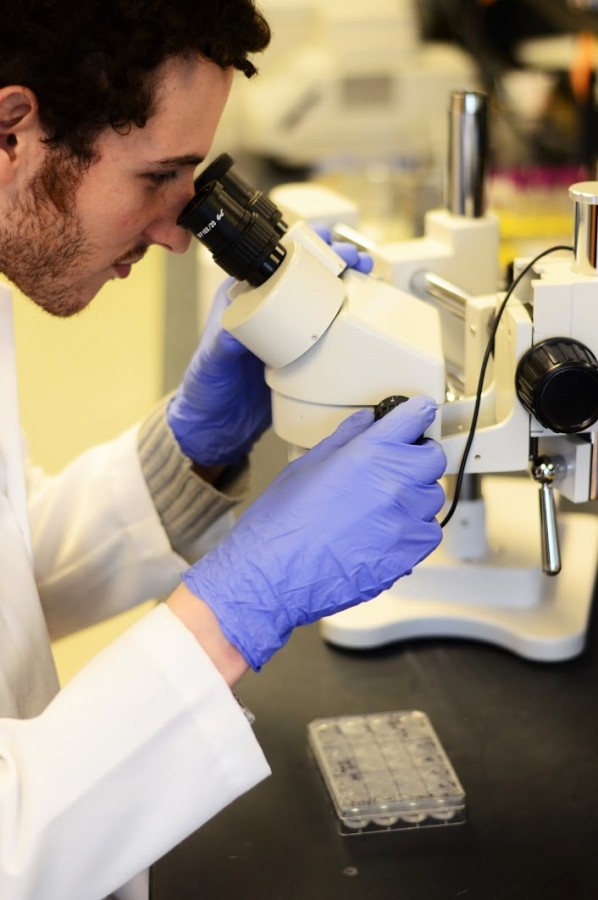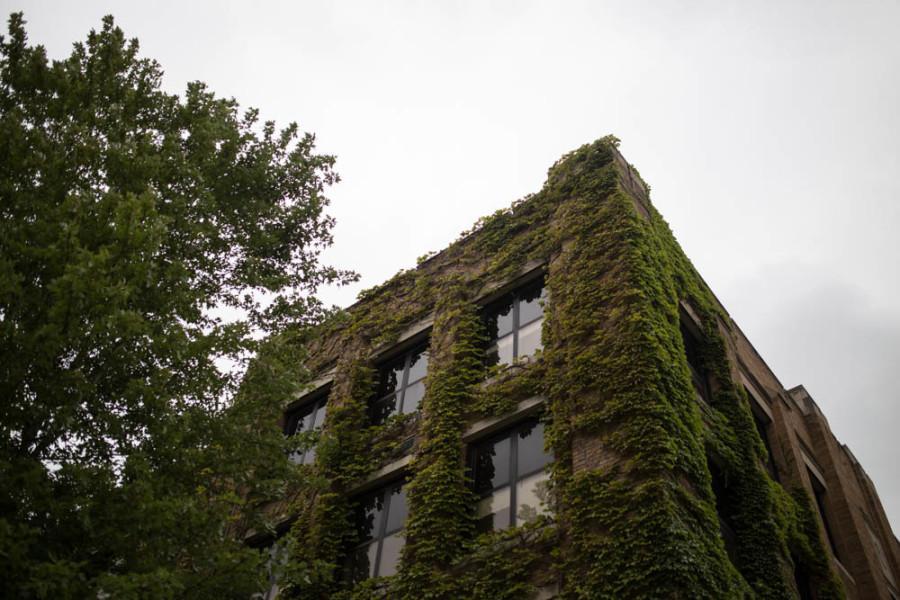
Murray Blackmore, an assistant professor in the College of Health Sciences, received a $90,000 grant to continue research on therapeutic genes that he hopes will aid spinal cord regeneration.
Unite 2 Fight Paralysis, an organization run by and for people with spinal cord injuries and their families, presented Blackmore with the grant Monday in his lab in Schroeder Complex.
“Spinal cord injury is an incurable affliction that affects hundreds of thousands of people in the United States with paralysis and loss of sensation,” Blackmore said. “Our lab is dedicated to discovering new therapeutic approaches to treat spinal cord injury.”
A spinal cord injury begins when the spine receives a sudden blow that fractures or dislocates the vertebrae. Most injuries do not sever the spinal cord, although they often fracture or compress the vertebrae. Some injuries result in complete recoveries, while others paralyze the victim for life, according to the National Institute of Neurological Disorders and Stroke.
Blackmore said his research is rather unconventional because it involves treating injured brain cells with gene therapy reagents.
“These reagents target specific genes in the damaged cell with the goal of rekindling their dormant potential for repair,” Blackmore said. “This work is important because it explores a novel strategy in the search for a cure to spinal cord injury.”
Blackmore said the grant will allow him to buy a highly specialized microscope that allows images to be quickly analyzed by computer algorithms.
“As we search for new therapeutic genes, we first test their efficacy in nerve cells that we grow in culture dishes,” Blackmore said. “The key importance of this grant is that it dramatically accelerates the pace at which we can test the effect of new candidate treatments – it’s a game-changer.”
Blackmore said that before the introduction of the microscope, researchers had to analyze individual cells to make a conclusion about whether the treatment was effective. He said that with the microscope, he will be able to analyze hundreds of cells and analyze their shape in a matter of minutes.
“The microscope opens the bottleneck, so now instead of focusing on a handful of candidate genes, we can test hundreds or thousands,” Blackmore said.
Blackmore said his research comes from the heart, and although he respects science for the sake of knowledge, the purpose of his research is to find a cure for spinal injury patients.
Donna Sullivan, the director of special projects at Unite 2 Fight Paralysis, said Unite 2 Fight Paralysis approached Blackmore to apply for the grant. Sullivan said U2FP understands the emotional and financial toll this injury takes on families, and it is committed to working with passionate researchers.
“We believe Dr. Murray Blackmore is one of those researchers and look forward to partnering with him in moving us closer to a cure for spinal cord injuries,” Sullivan said. “Together, our efforts will restore function to those living with paralysis and improve lives around the world.”
Sullivan said getting people off ventilators and restoring hand, bowel and bladder function can allow people to regain their independence and reduce the risk of complications.
“The research in Dr. Blackmore’s lab has the potential to restore function and change lives,” Sullivan said. “Just the return of a few levels of function will make an immense difference in people’s lives.”
Blackmore said he was blown away by U2FP when he attended its annual meeting last fall.
“Unite 2 Fight is an amazing and inspiring organization, run by and for people with spinal cord injuries and their families,” Blackmore said. “I’d like everyone to know who they are and the work they do.”
John Mantsch, chairman of the biomedical sciences department, said he was thrilled but not surprised that Blackmore received funding for his work. He said organizations such as U2FP are focused on identifying and supporting scientists whose research has potential for producing advances in spinal cord injury treatment.
“The groundbreaking research in Dr. Blackmore’s lab, which is aimed at developing new treatments using cutting-edge technology, as well as Dr. Blackmore’s stellar reputation in his field, make him an obvious partner for organizations such as this,” Mantsch said.
Mantsch said Blackmore’s research is directly related to Marquette’s goal of finding solutions to society’s most pressing problems, and that his research is a perfect example of Marquette emerging as a leading institute for neuroscience research.



Ken • Mar 2, 2013 at 5:06 pm
How does one become a volunteer for your research?
Leonardo Camargo • Feb 25, 2013 at 4:16 pm
Godspeed. we hope for results, soon